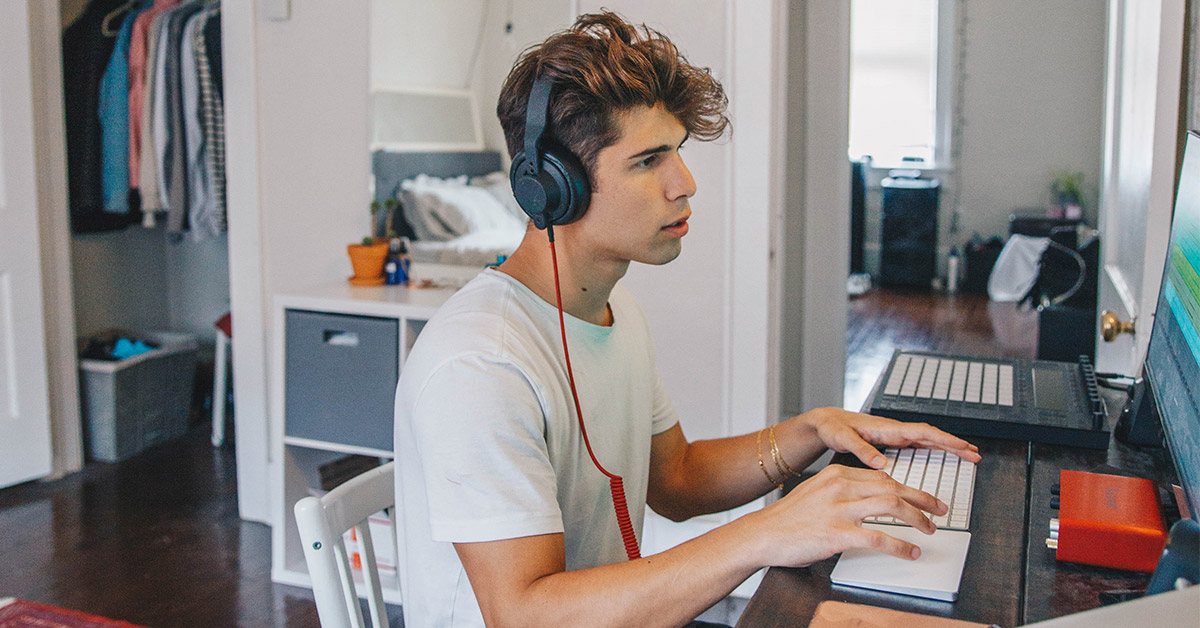
Everything about selling a screenplay is hard. You’ve got to convince studio executives your story is not only original and exciting but also appealing to a wide audience. This is no easy task, which is why it’s important to practice your pitching skills. But before you get to this point, you need to actually write the thing, which, again, is no small task.
Part of the reason it’s so difficult to sit down and write is that we need to do so when we’re at home, a place we associate with relaxation and anything else besides work.
However, if you’re serious about one day ditching your day job and writing screenplays full-time, then you need to figure out a way to be a more efficient writer when you’re at home. Here are a few tips to help you get started.
1. Create a Designated Writing Space
To write efficiently from home, you must have somewhere you can go and hide. You need a place in your house or apartment—preferably with a locking door—where you can shut yourself off to the world and write.
Consider cleaning out a room you’ve been using for something else, or if you don’t have a separate room available, clean out a corner of a common area and claim it as your own. Have roommates who aren't going to be happy? Buy them something nice and tell them your dreams are on the line. They’ll understand.
2. Optimize The Space
When setting up this space, make sure it’s comfortable. You want it to be a spot where you could spend hours without even really noticing it. This means filling it with things that bring you peace.
Vinyl record players, incense, a musical box, and photos of your friends and family all work. Some people like to put up inspirational notes to themselves or copies of rejection letters, but for others, this doesn’t work so well. In the end, it doesn’t matter what you choose, so long as it makes you feel at ease and ready to work.
Another thing to pay attention to is ergonomics. Most people think they can sit in front of a computer for hours at their kitchen table, but they really can’t. Hunching over a computer for that long is going to strain your neck and back, and being in pain is a perfect excuse to quit before you’ve reached your daily writing goals.
Here’s an outline of how to best set up your workspace, but these are the key points to remember:
- Place your computer screen at eye level so that you do not need to strain your neck to work. Sometimes all you need to do is put your laptop on a stack of books to raise it up, and you’d be surprised how much of a difference this can make.
- Make sure you have a chair that allows you to put your feet flat on the floor and that properly supports your back.
- Invest in an ergonomic keyboard so that your wrists and fingers don’t get tired as often and you can keep working.
3. Remove Distractions
To be as efficient as possible, it’s important to understand how our brain works. To be more specific, you need to accept that we focus in two ways. First, our brain works to pay attention to what it thinks is important, and in a separate process, it sorts through all the information it receives from the external world to help you weed out what’s not important and stay focused on what is.
It turns out our brains are quite good at the first part of this, but as we get older and we lose some brain function, and as our lives become more complicated, it becomes more and more difficult for our brains to block out the many distractions competing for our attention.
So, your job is to help your brain out. When you sit down to write, leave your phone in another room, close out social media, and tell those around you that you’re not to be bothered. This isolation might be difficult at first, but it’s a great way to close yourself off to the world around you so that you can stay focused on your writing.
Learn the best way to structure your screenplay with this free guide.
4. Do Some Warm-Up Work
Switching into writing mode is harder than we think. We’d all like to sit down and immediately start putting down our best work. But it doesn’t always work this way, and when we struggle in the beginning, it’s easy to convince ourselves it’s simply not our day.
But to be more efficient, you need to fight this feeling and power through. A great way to do this is to spend some time on warm-up work. This could be your personal journal, some easy work stuff, emails, or any other activity that requires you to do a bit of writing, such as writing some poetry or doing some free association. Even doing a crossword puzzle could work.
The point is to get your brain into writing mode so that when you turn your attention to your screenplay you can give it your full attention. You’d be surprised how spending just 20 minutes warming-up can hone your focus and help you be more productive.
5. Trial and Error
There is no silver bullet solution for improving how efficient you are when writing from home. It’s likely one or more of the solutions suggested above will work, but everyone has their own ways of staying focused and being more efficient.
As a result, if you’re not happy with your level of efficiency, then the best thing you can do is to start trying out new things. When something works, stick with it. And if it doesn’t, ditch it and try something new. You’ll soon find your formula for success, and once that happens, there will be no stopping you.
Kevin is the founder and CEO of Broadband Search. As a digital entrepreneur, he has spent countless hours developing blog and other online content to help him grow his business. In his free time, he writes science fiction short stories, as well as some amateur poetry, and he’s always keen to offer his advice to anyone looking to figure out how to make more out of their productive time.
For all the latest ScreenCraft news and updates, follow us on Twitter, Facebook, and Instagram.
Get Our Screenwriting Newsletter!
Get weekly writing inspiration delivered to your inbox - including industry news, popular articles, and more!



























